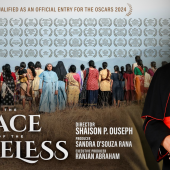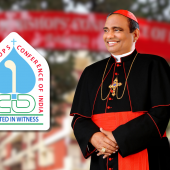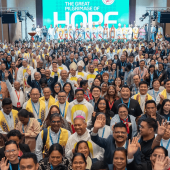Benedict XVI did theology on his knees
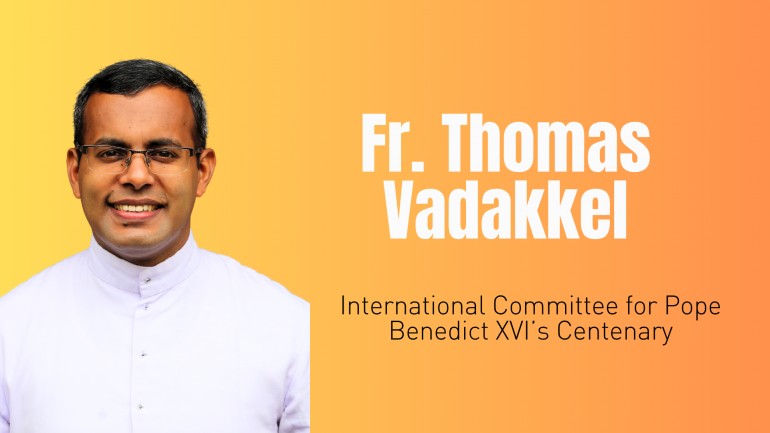
An interview with Fr. Thomas Vadakkel, member of the International Committee for Pope Benedict’s centenary celebrations
An Indian Catholic priest recently made news after being named to the International Committee tasked with preparing the global celebrations for the 100th birth anniversary of Pope Benedict XVI in 2027.
Forty-five-year-old Father Thomas Vadakkel is a priest of the diocese of Palai, a Syro-Malabar jurisdiction in the southern Indian state of Kerala. He currently serves as Secretary of the Office for Doctrine of the Catholic Bishops’ Conference of India (CBCI).
An accomplished theologian, Father Vadakkel holds both a PhD and an STD in Biblical Theology from the Faculty of Theology and Religious Studies at the Katholieke Universiteit Leuven, Belgium. For the past nine years, he has been an Assistant Professor at the Pontifical Oriental Institute of Religious Studies in Vadavathoor, while also teaching at various theological faculties across Kerala and other states in India.
In an email interview with the Chief Editor of Radio Veritas Asia, Fr. Vadakkel shared his reactions to the appointment, his thoughts on the significance of the centenary celebrations, Pope Benedict XVI’s theological legacy, the impact of his resignation, and more.
Excerpts:
How did you receive the news of your appointment to the International Committee? What was your initial reaction?
I received two official letters from Rev. Fr. Federico Lombardi, SJ, President of the Joseph Ratzinger, Benedict XVI Vatican Foundation. He is well known for having served as the Director of Vatican Radio, the Vatican Television Center, and the Holy See Press Office, working closely with both Pope Benedict XVI and Pope Francis. I was genuinely surprised and deeply honored to receive such an invitation to be part of this noble task of promoting and preserving the theological legacy of Pope Benedict XVI.
How did your name come to be considered for the committee? Was there a formal invitation or nomination?
I have been serving as the Secretary of the Catholic Bishops' Conference of India (CBCI) Office for Doctrine, and I assume that my name was put forward through the CBCI Secretariat. I directly received a formal communication regarding the appointment, but I believe the nomination may have been based on my role and involvement in theological work at the national level.
What exactly does your role in the International Committee entail? Will it involve travel to Rome or participation in specific events?
My role in the International Committee involves contributing to the planning and promotion of various initiatives that highlight the theological and cultural legacy of Pope Benedict XVI in the lead-up to the centenary of his birth in April 2027. This includes helping to organize academic conferences, encourage research and publications, and propagate his thoughts through books and journals, particularly in the Indian and Asian contexts. There may be occasional travel to Rome or other locations for committee sessions and preparatory meetings, especially as we approach the concluding international conference at the Vatican in April 2027. At the moment, I am awaiting further guidelines from the Foundation in the Vatican, but I am honored to be part of this global effort to make Ratzinger’s theological vision resonate with today’s challenges and to engage young scholars in carrying forward his living tradition.
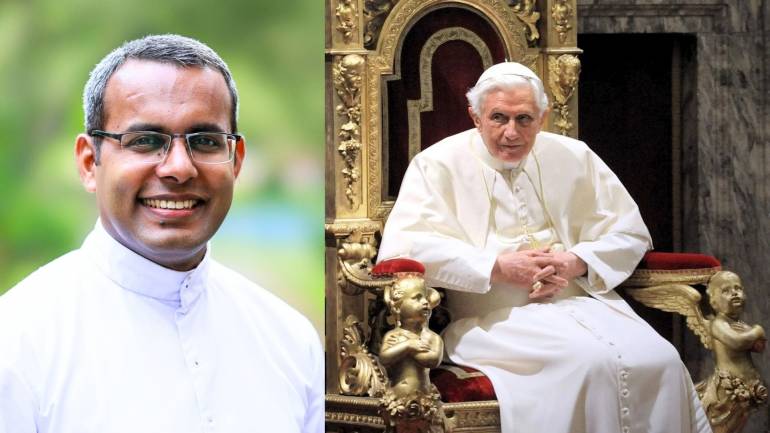
As a theologian yourself, what is it about Joseph Ratzinger’s theology that speaks to you most deeply?
As a theologian, what speaks most deeply to me about Joseph Ratzinger’s theology, particularly in the area of biblical interpretation and hermeneutics, is his profound integration of faith and reason in reading Scripture, and his insistence that the Church is the proper hermeneutical context for interpreting the Bible.
Moreover, I am deeply interested in Cardinal Ratzinger’s thought, which provides profound wisdom on the providential nature of the Church’s trials, shedding light on essential truths of Catholic faith and life. His reflections on the sacramental nature of the priesthood, the Eucharist as the sacrifice of Christ, the redemptive value of suffering, and the indispensable mission of the laity in the apostolate are also well worth meditating upon.
What do you consider Pope Benedict XVI’s most enduring contribution to theology and the life of the Church?
Pope Benedict XVI’s most enduring contribution to theology and the life of the Church is his profound integration of faith and reason, affirming that truth is both accessible and transformative when sought through both the light of revelation and the clarity of intellect. He brought theology back to its core: an encounter with the living God in Jesus Christ, the Word made flesh. His Christ-centered vision, rooted in Scripture, tradition, and the liturgy, offered the Church a way to remain faithful while engaging the modern world with confidence and clarity. Through his writings and example, he showed that theology is not merely academic but a path to holiness and communion with God.
Moreover, I believe that the vision, teachings, and theological reflections of Pope Benedict XVI are deeply in consonance with the teachings of the early Church Fathers as well as with the rich theological insights of the Eastern tradition. His emphasis on mystery, liturgy, communion, and the centrality of the incarnate Word resonates strongly with both patristic thought and the Eastern Christian vision of theology as a path to divine participation. His theology bridges East and West, offering a deeply rooted yet forward-looking understanding of the faith.
Pope Benedict XVI made a historic decision in resigning from the papacy. How do you interpret that decision today, in the light of his personality and vision?
Pope Benedict XVI’s resignation reflects his deep humility, realism, and trust in Divine Providence. It was not an act of retreat, but a courageous recognition of his physical limits in serving the Church, rooted in his lifelong vision that the papacy is a ministry of service, not power.
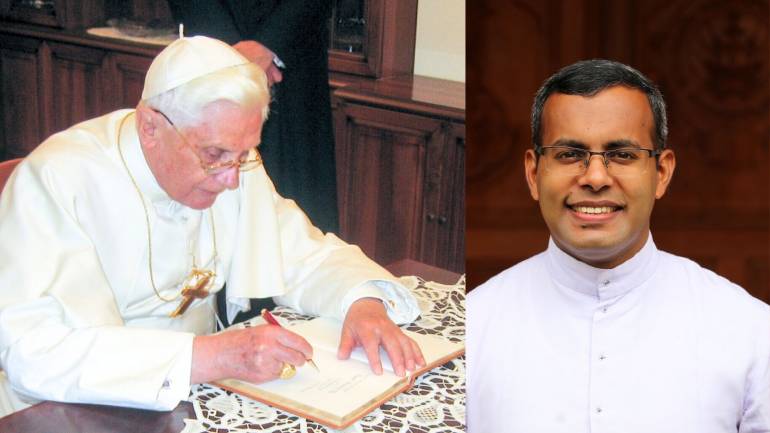
Some have described Ratzinger as too conservative or rigid in his theological positions. How would you respond to such critiques?
No, Ratzinger was not too conservative, but I say extraordinarily courageous. He was a man of deep conviction and unwavering faith, rooted in the truth of the Gospel and the living tradition of the Church. His theology is not rigid but grounded, born from a profound love for Christ and a desire to guard the integrity of the faith in a rapidly changing world. His clarity and fidelity offer not constraint, but freedom through truth.
What message would you like to share with young theologians or seminarians today, especially in Asia, regarding the relevance of Pope Benedict XVI’s theological legacy?
In the introduction to the book Dio è Sempre Nuovo (God is Ever New), a collection of the spiritual reflections of Pope Benedict XVI, Pope Francis wrote: “Benedict XVI did theology on his knees.” This simple yet profound statement captures the essence of his theology, one rooted in prayer, humility, and deep reverence before the mystery of God. Pope Benedict XVI frequently expressed the idea that theology should be approached with deep faith and prayer, often using language that suggests a posture of reverence and humility. To young theologians and seminarians in Asia, Pope Benedict XVI’s legacy reminds us that theology must be done on one’s knees, with the humility of faith and the courage to seek truth.
Lastly, what does this appointment mean to you personally, as an Indian priest and theologian, and what do you hope to contribute to the centenary celebration?
This appointment is a profound honor for me personally, as an Indian priest and theologian and member of the Syro-Malabar Church, an Eastern sui iuris Church, to be entrusted with the task of helping preserve and promote the theological legacy of Pope Benedict XVI, one of the most brilliant minds and humble servants of the Church in our time. It is also a responsibility I embrace with gratitude and humility, representing the rich theological reflection emerging from Asia, especially India. I hope to contribute by highlighting how Ratzinger’s Christ-centered, tradition-rooted, and intellectually rigorous theology speaks powerfully to the challenges of our diverse and dynamic contexts, and by helping engage young theologians and seminarians in discovering the enduring relevance of his thought for the future of the global Church.
Radio Veritas Asia (RVA), a media platform of the Catholic Church, aims to share Christ. RVA started in 1969 as a continental Catholic radio station to serve Asian countries in their respective local language, thus earning the tag “the Voice of Asian Christianity.” Responding to the emerging context, RVA embraced media platforms to connect with the global Asian audience via its 21 language websites and various social media platforms.









